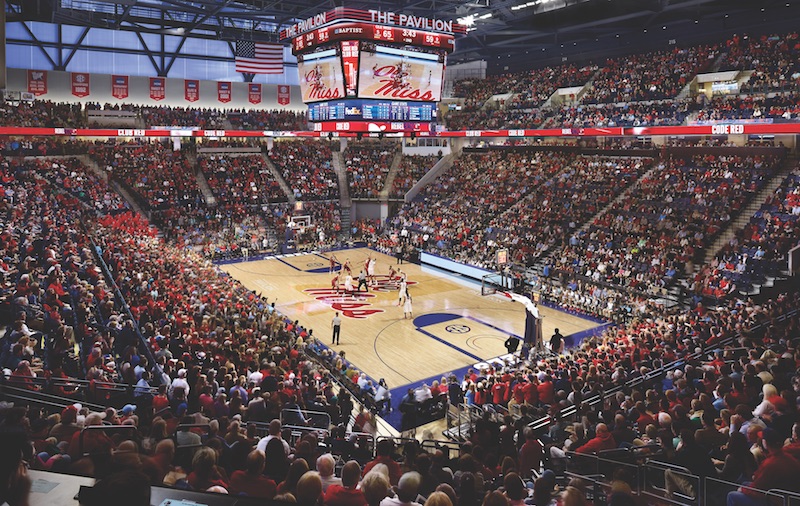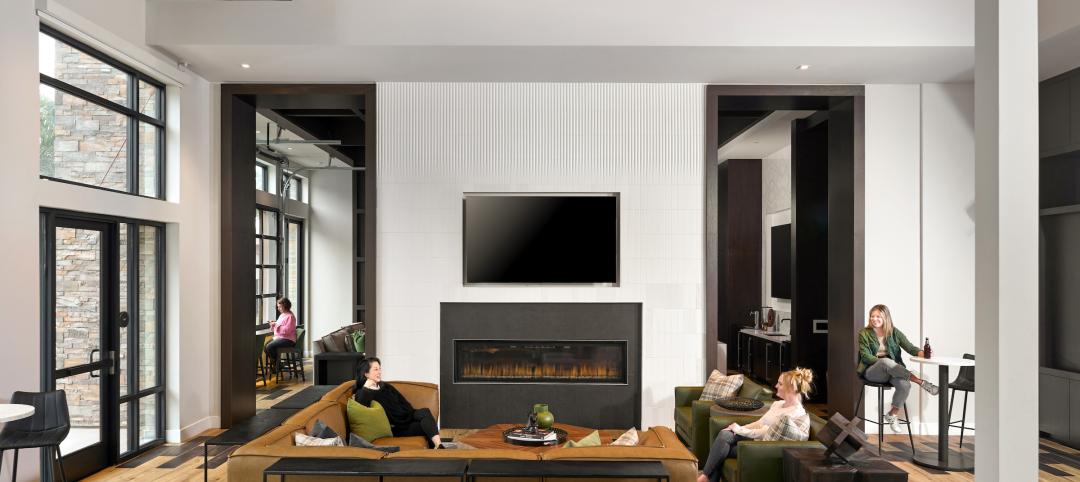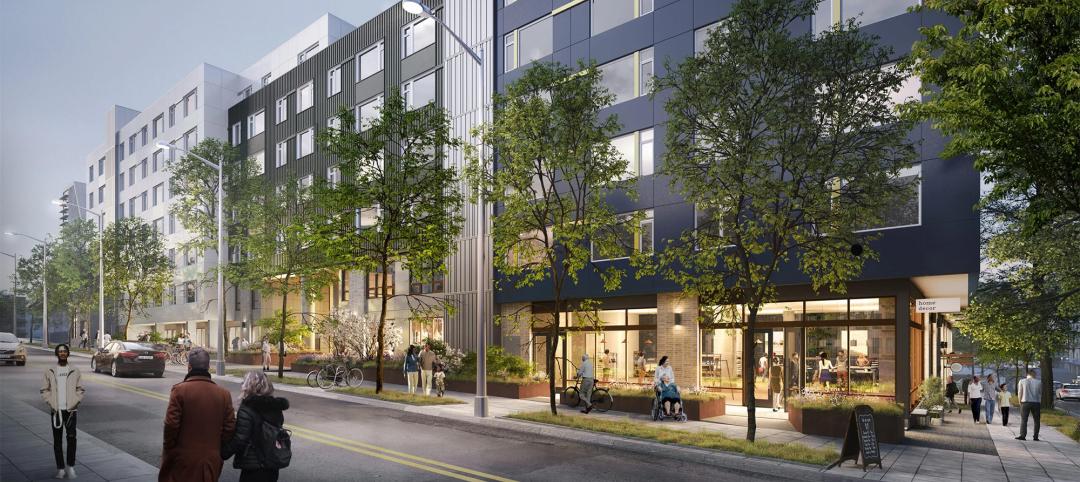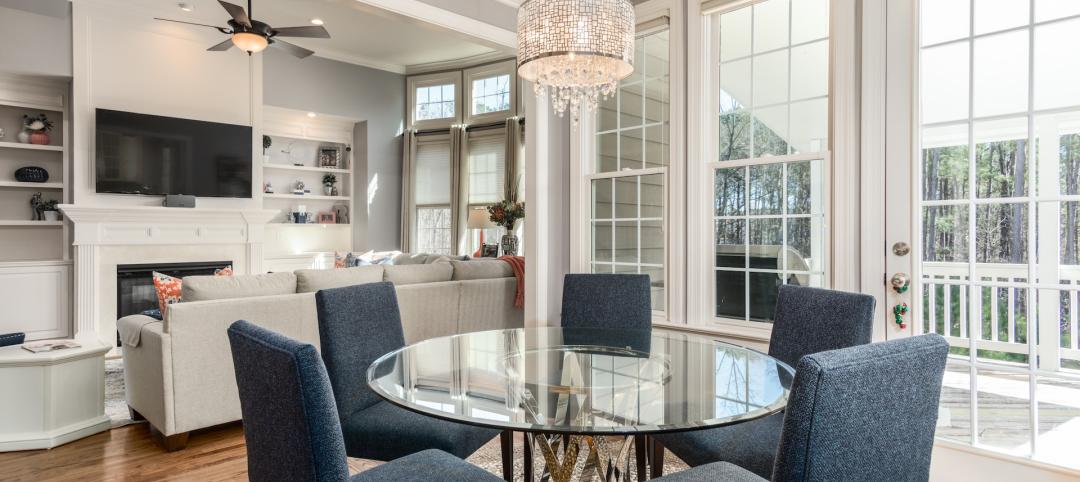The University of Nebraska Omaha’s hockey program has experienced modest success since its establishment in 1997, but last year marked the Crimson and Black’s first brush with the elite. The Mavericks reached the 2015 NCAA Frozen Four, the semifinal round of the NCAA Men’s Division I Ice Hockey Tournament.
TOP 50 SPORTS FACILITY ARCHITECTURE FIRMS
Rank, Firm, 2015 Revenue
1. Populous $113,741,160
2. HKS $81,220,737
3. HOK $58,589,000
4. Gensler $42,850,000
5. HNTB Corporation $13,419,171
6. Cuningham Group Architecture $10,238,235
7. Moody Nolan $9,800,000
8. Sink Combs Dethlefs $9,719,919
9. VOA Associates $9,577,715
10. Stantec $8,654,844
TOP 60 SPORTS FACILITY CONSTRUCTION FIRMS
Rank, Firm, 2015 Revenue
1. Mortenson Construction $837,136,000
2. AECOM $692,550,000
3. Turner Construction Co. $452,522,888
4. PCL Construction Enterprises $368,505,497
5. Manhattan Construction Group $277,528,000
6. Barton Malow Co. $266,882,651
7. Holder Construction Co. $154,000,000
8. Skanska USA $150,328,639
9. Brasfield & Gorrie $141,714,487
10. Pepper Construction Group $129,770,000
TOP 30 SPORTS FACILITY ENGINEERING FIRMS
Rank, Firm, 2015 Revenue
1. AECOM $30,000,000
2. Thornton Tomasetti $21,316,147
3. ME Engineers $18,950,000
4. Walter P Moore $18,678,163
5. WSP | Parsons Brinckerhoff $18,245,000
6. Henderson Engineers $18,179,333
7. Smith Seckman Reid $7,981,930
8. Jacobs $6,930,000
9. Magnusson Klemencic Associates $4,134,707
10. KJWW / TTG $3,320,000
UNO hockey’s good times keep rollin’ on. Last fall, the school opened the $86 million, 220,000-sf Baxter Arena, the team’s new home. Designed by HDR and Lempka Edson Architects, the 7,898-seat arena has 17 luxury suites, 750 club seats, and a 750-seat student section. Open concourses let fans see the game even when standing in line for concessions. A split bowl design keeps spectators on top of the ice.
The arena, which also hosts basketball and volleyball, isn’t just for UNO sports. The building is a focal point for the entire community. An attached community ice rink stands at the front of the building. (The UNO varsity plays on the main rink.) The public can access the community rink for open skate, curling, and club hockey. With 25-to-30-foot floor-to-ceiling windows, light is drawn in during the day; at night, visitors outside the building can peer in and see the ice.
In addition to concerts, shows, and lectures, Baxter Arena has emerged as the preferred setting for local graduation ceremonies. The Omaha World-Herald reported that 13 area high schools booked the arena for commencements this spring. The arena’s seating capacity is comfortably in between constrictive and cavernous. Free parking for 2,400 vehicles will easily accommodate all its guests.
Other schools are renovating existing structures or building new sports facilities that can serve the student body and surrounding community.
GAINING YEAR-ROUND USE
The 9,500-seat Pavilion at Ole Miss, in Oxford, Miss., opened in January. Home to the Rebels’ men’s and women’s basketball teams, the University of Mississippi’s multipurpose arena, designed by AECOM, also hosts concerts, events, and academic and student activities. A retractable lower bowl allows seating for group lectures and convocations.
The Pavilion Club on the eastern side of the arena serves as multi-use club space between basketball and football seasons. Since it’s right across a walkway from Vaught Hemingway Stadium, it will be a pre-game and game club during football season.
Even on non-game days during the week, students can access a food court just inside the north arena entry. It features two concession stands and comfortable seating, with a covered exterior plaza space.
MIXING SPORTS AND ACADEMICs in south bend
The University of Notre Dame is undertaking an even more complex sports/academic project. The South Bend, Ind., school is in the throes of turning Notre Dame Stadium into the hub of the campus. Total stadium capacity is being enlarged by 3,000–4,000 seats. Vinyl-clad benches are replacing wood bench seats, and a new video board and ribbon boards are being installed.
But the upgrade doesn’t stop at the stadium ticket window. Three new academic buildings are being built onto the stadium. The Campus Crossroads Project will add more than 800,000 sf of classroom, research, digital media, event, and student life space.
Nate Appleman AIA, LEED AP, HOK’s Director of Sports, Recreation, and Entertainment, says university officials looked at the site and determined that they had the room to turn the site into a focal point right in the core of campus. He says the question became, How does Notre Dame capitalize on that?
The nine-story Duncan Student Center sits on the west side. The first five floors contain fitness facilities, lounges, a meeting room, a career services center, a dining area, and a ballroom. The upper floors have gameday features like premium seating and booths for coaches and media.
The nine-story Corbett Family Hall, which houses the anthropology and psychology departments and a digital media center, sits on the east side. Its upper levels have the stadium press box, outdoor club seating, and club space. The seven-story Music and Sacred Music hall for the Department of Music and the Sacred Music program is located to the south. That facility has recital and rehearsal halls, a music library, and a lounge. Mechanical space for the scoreboard and football operations is on the uppermost story.
HOK was the sports, recreation, and hospitality consultant to S/L/A/M Collaborative (design architect). HOK designed in-stadium features, such as n loge boxes and press facilities. The new HOK-designed Student Recreation Center in the Duncan Student Center features an indoor track, a four-story climbing wall, boxing areas, and training turf. The facility triples the amount of fitness space available to students. The firm also designed terraces on each building that will offer views of the playing field and campus.
Appleman says that the concept of making a stadium into an environment that’s inhabited 365 days a year as a campus core building is an idea that’s replicable.
“This is going to be something that’s going to spread like wildfire throughout the college landscape, no doubt,” he says.
RETURN TO THE GIANTS 300 LANDING PAGE
Related Stories
MFPRO+ Special Reports | Oct 27, 2023
Download the 2023 Multifamily Annual Report
Welcome to Building Design+Construction and Multifamily Pro+’s first Multifamily Annual Report. This 76-page special report is our first-ever “state of the state” update on the $110 billion multifamily housing construction sector.
Giants 400 | Oct 23, 2023
Top 190 Multifamily Architecture Firms for 2023
Humphreys and Partners, Gensler, Solomon Cordwell Buenz, Niles Bolton Associates, and AO top the ranking of the nation's largest multifamily housing sector architecture and architecture/engineering (AE) firms for 2023, as reported in Building Design+Construction's 2023 Giants 400 Report. Note: This ranking factors revenue for all multifamily buildings work, including apartments, condominiums, student housing facilities, and senior living facilities.
Affordable Housing | Oct 20, 2023
Cracking the code of affordable housing
Perkins Eastman's affordable housing projects show how designers can help to advance the conversation of affordable housing.
Senior Living Design | Oct 19, 2023
Senior living construction poised for steady recovery
Senior housing demand, as measured by the change in occupied units, continued to outpace new supply in the third quarter, according to NIC MAP Vision. It was the ninth consecutive quarter of growth with a net absorption gain. On the supply side, construction starts continued to be limited compared with pre-pandemic levels.
Warehouses | Oct 19, 2023
JLL report outlines 'tremendous potential' for multi-story warehouses
A new category of buildings, multi-story warehouses, is beginning to take hold in the U.S. and their potential is strong. A handful of such facilities, also called “urban logistics buildings” have been built over the past five years, notes a new report by JLL.
Building Materials | Oct 19, 2023
New white papers offer best choices in drywall, flooring, and insulation for embodied carbon and health impacts
“Embodied Carbon and Material Health in Insulation” and “Embodied Carbon and Material Health in Gypsum Drywall and Flooring,” by architecture and design firm Perkins&Will in partnership with the Healthy Building Network, advise on how to select the best low-carbon products with the least impact on human health.
Contractors | Oct 19, 2023
Crane Index indicates slowing private-sector construction
Private-sector construction in major North American cities is slowing, according to the latest RLB Crane Index. The number of tower cranes in use declined 10% since the first quarter of 2023. The index, compiled by consulting firm Rider Levett Bucknall (RLB), found that only two of 14 cities—Boston and Toronto—saw increased crane counts.
Office Buildings | Oct 19, 2023
Proportion of workforce based at home drops to lowest level since pandemic began
The proportion of the U.S. workforce working remotely has dropped considerably since the start of the Covid 19 pandemic, but office vacancy rates continue to rise. Fewer than 26% of households have someone who worked remotely at least one day a week, down sharply from 39% in early 2021, according to the latest Census Bureau Household Pulse Surveys.
Luxury Residential | Oct 18, 2023
One Chicago wins 2023 International Architecture Award
One Chicago, a two-tower luxury residential and mixed-use complex completed last year, has won the 2023 International Architecture Award. The project was led by JDL Development and designed in partnership between architecture firms Goettsch Partners and Hartshorne Plunkard Architecture.
Giants 400 | Oct 17, 2023
Top 130 Sports Facility Architecture Firms for 2023
Populous, Gensler, HOK, and HKS head BD+C's ranking of the nation's largest sports facility architecture and architecture/engineering (AE) firms for 2023, as reported in Building Design+Construction's 2023 Giants 400 Report.

















